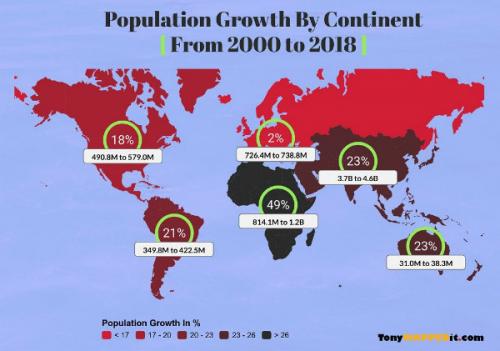The Detriments of Overpopulation in Africa

For a
continent that has been famously condemned by one of its greatest economical
allies and aid-provider on the matter of their overpopulated nations, Africa is
yet to see any changes. In fact, Sub-Saharan Africa is estimated to have its
population density double by the next thirty years, putting it at the top-most
pedestal as the world’s greatest populous region, as depicted by this map from Tonymappedit.com.
Africa
has earned a significant name in terms of its high poverty rates, signifying
how challenging it is to live in the continent. Economical problems consisting
of the inability to gather enough resources for the needs of its citizens, the
lack of proper infrastructure impeding development as well as the undersupply
of standard public services, such as healthcare and education – are all factors
hindering the economical development of such a gigantic continent. To add on
top of this endless list of adversities, the recent strike in their population
rates, that is yet to dull out, has demonstrated even greater and more
stressing impediments in Africa’s prospective economic growth. The higher
fertility rates represent a larger amount of economical demands, ranging from
food to shelter. This puts a considerable burden on the government’s budgets
and therefore, resource allocation can be quite a hefty task.
Furthermore,
the relatively higher fertility rates facing Africa also accounts for the more
than half of the world’s population between the years of the present to the
year 2050. According to data analysis and research done by the UN, the African
region is expected to continue its ginormous growth even at the end of the
century, meaning there will be more people in Africa than anywhere in the world
then.
Certain
regions in Africa have been noted to be the main contributor of such
considerable levels of population, with the examples being Nigeria, Sahara,
Tanzania and such. Such regions have had heightened population growths over
decades, resulting in the estimated economic hurdles facing Africa to be much
greater than it used to be. For instance, Nigeria’s population had risen
exponentially from 1990 to the current year, with more than a hundred million in
births whereby women are reckoned to have more than seven children on average.
The region now faces an expectation of more than four hundred million people
living in it by the year of 2050, reigning on the spot as the third most
inhabited country in the world.
While the
reasons for such heavy growth in population differ by areas and policies, most
point out to be a blatant refusal to take up any measure to alleviate this
particular problem. Ideas relating to religious restrictions or certain social beliefs
have lead to many taking in as much children as possible, resulting in a
sky-rocket level of birth rates. In some places, such as Tanzania, the
president himself declared an eradication of birth control due to the belief
that it was ‘parental laziness’. In fact, the president even announced a policy
over free schooling so as to ensure females aren’t restricted on birth over
financial concerns. However, this negative view on the use of contraceptives
has emerged a greater problem in the economy that is rather hard to scrap away.
With more pressure on the government budget in order to cater to more babies
being born and a large number of medical costs to cover, along with a
considerable stress on the existing resources, especially non-renewable resources,
the economy of Africa is soon to deteriorate under the heavy wings of a fast
growing population that cannot be lessened, in any circumstance or any short
period of time.









Comments